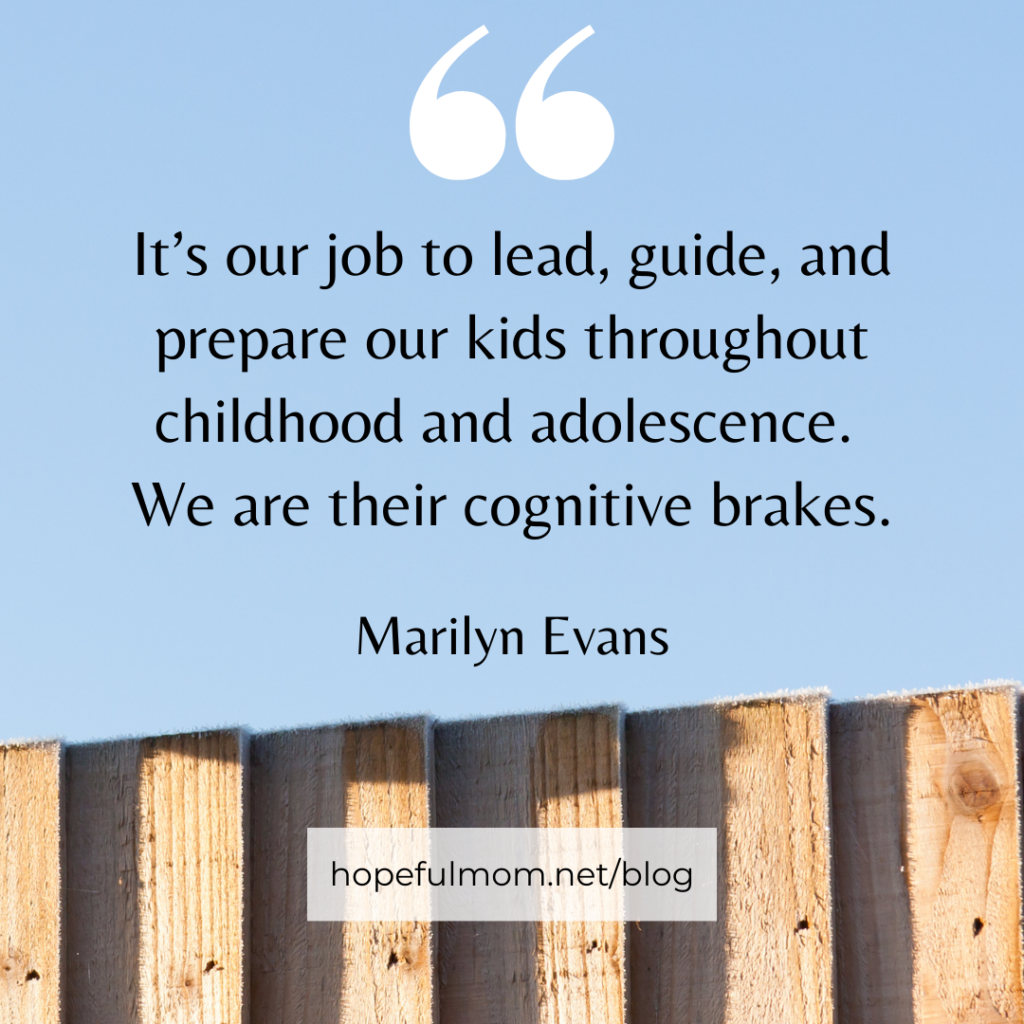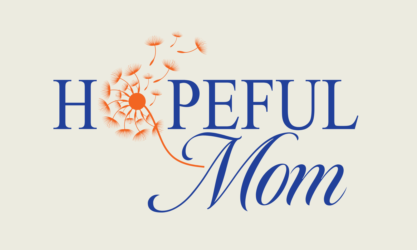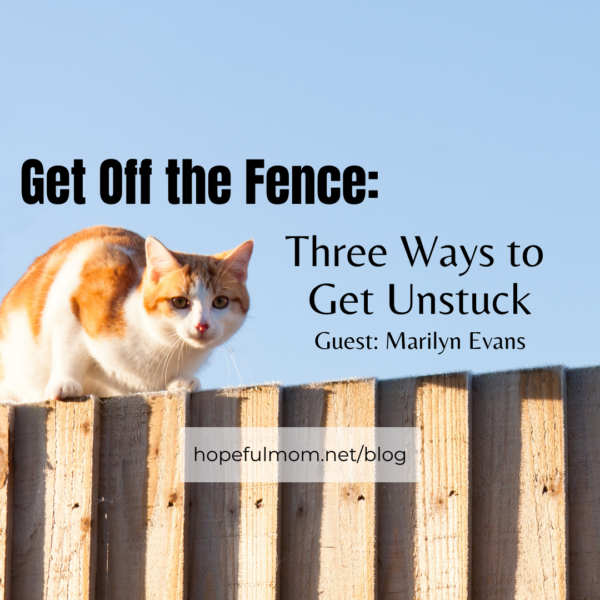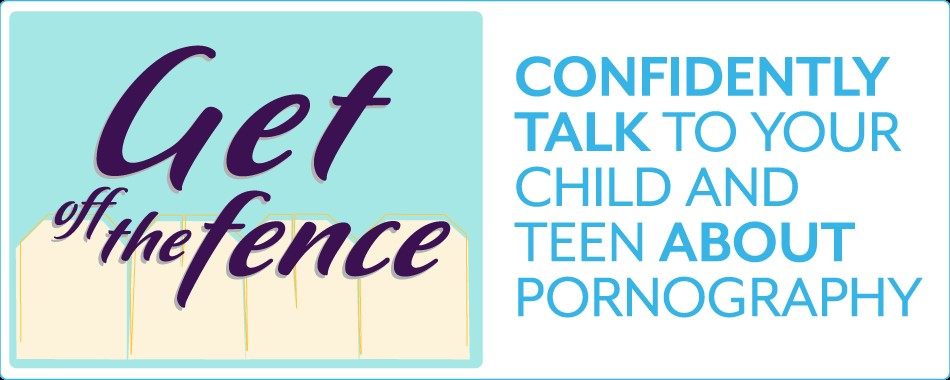I am beyond excited that Marilyn Evans of Parents Aware is here again to offer her words of wisdom to parents. Marilyn is my good friend and mentor. She has taught me so much about pornography and parenting. I love her hopeful attitude. Marilyn recently launched a course for parents, to help them get off the fence and talk with their children about this important topic. Read to the end for my review of the course and how you can find it.
You’re here. That’s amazing! It tells me you already know why it’s important to talk to your child about pornography. I bet you’re also keenly aware this conversation is not a one-time deal. You’ve figured out that every age and stage of development presents new challenges for your child online.
You’re the kind of parent who wants your home to be a safe place to talk about anything. You expect to have important and meaningful conversations. You are willing to talk. It doesn’t really matter how tricky the topic is.
It’s not the what that has you feeling stuck. It’s the how.
How do I know this? Well, after raising five boys and speaking out for more than five years on this topic, there are still days that I feel stuck. Days when I have to ask myself:
- How am I going to help my child navigate this challenge?
- How am I going to help them thrive in this media-saturated world?
- How can I possibly broach this topic?
All in this together
The more I talk with other parents, the more I appreciate that we’re all feeling it. Nervous, anxious, underprepared, and overwhelmed. You. Are. Not. Alone. We’re in this together.
Still, we can’t stay stuck. We have to find the strength to move forward, the courage to open our mouths. Our kids are depending on us to be bold, brave, and honest. It can be tempting to do what I term sit on the fence—to delay the conversation or avoid it altogether. But you know that won’t help.
Ready to get off the fence?
So today, I am going to share three strategies that I still use to help me look at the conversation differently and get off the fence!
- Admit what feels uncomfortable
- Boldly appreciate the real cost of silence
- Put yourself in their brain
Reviewing these three things ultimately gives me the courage to talk even when I feel nervous or anxious about how to begin.
1. Admit out loud what feels uncomfortable
Does your voice suddenly disappear with any attempt to speak the word pornography? Maybe it feels like you’re crossing a line. Like you’re doing something dirty or taboo. You’re not alone in this. Many parents worry about saying or doing the wrong thing. I know I did.
Does your voice suddenly disappear with any attempt to speak the word pornography? Marilyn Evans says hers did. The good news is, you can learn to overcome this discomfort. Here are a few steps. Get Off the Fence: Three Ways to Get… Share on XThe good news is, you can learn to overcome this discomfort with a few basic steps.
- First, talk to yourself. Repeat the word pornography in private until you can almost shout it without hesitation.
- Next, talk to a close friend or spouse. Express your inhibitions. Listen carefully to their thoughts and insights. As you share together your confidence will grow.
- Finally, talk to your child. Explain outright that you would like to discuss pornography. Be honest and open about your insecurities.
You don’t need to be perfect. If you blunder through, blush, or are still embarrassed, that’s ok. In fact, it’s more than ok. It shows that you’re human. Children are very forgiving creatures. Your bravery and willingness to talk honestly will inspire them to do likewise.
Remember, the first conversation is often the hardest. When it’s done (and keep it short!), give your child a hug and thank them for talking with you. Next, let them know you plan to come back to this important topic often.
2. Appreciate the real cost of silence
Once you’ve mastered speaking the word pornography out loud. The next big hurdle to overcome is the worry that talking honestly about the harms of pornography could somehow spark or renew a child’s interest in seeking out forbidden content.
So many parents fret over this. But truthfully, this is a big fat lie. Silence on the topic actually prevents kids from getting the help and information they need to stay safe and healthy.
But I get it. I used to think that talking about sexual things too early, would rob my children of their innocence. Eventually, it dawned on me that my silence was an open invitation for the media to step in and take my place. No parent wants that!
So I asked my kids outright if me talking to them about pornography made them more curious. Do you know what their answer was? “Honestly mom, we wish you had talked to us sooner!” Ouch!
Kids are sponges. They are curious by nature. It’s how they learn and grow. Understanding that my child needed me to answer their questions shed a whole new perspective on preserving innocence. Suddenly, I was ready to talk.
I can’t stress enough how important it is to discuss the harms of pornography within the context of your own family values. Our kids are waiting for us to start this conversation!
3. Put yourself in their brain
Ever consider how incredible your child’s brain is? I mean that’s where they process all the cool stuff they do, like math, or music, or sports. Their brain is awesome! And during adolescence it’s a powerhouse! There’s very little a teenage brain can’t figure out. But it’s also very vulnerable.
With all that processing power, the adolescent brain hasn’t quite learned how to put on the brakes. Oh, it can act on instinct without hesitation. Emotional influence comes in as a close second. But thinking and reasoning? Well, that’s a few years down the road.
But here’s the thing. Everybody’s brain—regardless of age, race, or gender—is biologically wired to be attracted to sexualized images. When it sees something sexy or erotic it literally lights up. It does this on instinct. It doesn’t even need to know why.
And when a child or teen stumbles across pornography, guess what? Their brain responds 100% with instinct and emotion. Instinct compels them to keep looking. And the emotional response could be anything from shock and horror to intrigue and curiosity to arousal and pleasure.
Reason really doesn’t enter the equation at this point. Imagine how confusing and scary that could be?

That’s where parents come in. It’s our job to lead, guide, and prepare our kids throughout childhood and adolescence. We are their cognitive brakes. And in today’s media-saturated world that means talking to them about pornography!
All kids deserve fair warning. They need to know what they could encounter online and why it is harmful. They also need to know that it’s very natural to be curious about sex. And that talking to a parent or other caring adult can help build safer screen habits.
Mistakes, yes. Regrets, no.
I wouldn’t say that talking to my kids about pornography (or sex) has come naturally to me. Still, every single time I have given it my best effort it was worth it. Through these conversations I feel I have grown closer to my kids. It didn’t matter if they were six or sixteen, they wanted to know my thoughts on these tricky topics.
Not every conversation went smoothly. I have made mistakes along the way. When less-than-perfect happens, I discovered it’s ok to take a step back, stop, listen, and try again.
One thing I have never regretted is getting out of my comfort zone (getting off the fence) and starting the conversation.
**** If you like these three tips, then you will love Parents Aware’s practical parenting course: Get Off the Fence: Confidently Talk to Your Child or Teen About Pornography.
I highly recommend Get Off the Fence. Marilyn Evans is compassionate, but also direct and to the point. Every minute of this six-lesson course is full of wisdom. I love how Marilyn asks parents to uncover their family’s core values. She then gives clear, concise steps and guidelines on how to evaluate your view of pornography, talk it through with a friend, and prepare to discuss this difficult subject with your child – all without putting words in your mouth or telling you what to think or say. She provides simple exercises to complete through each lesson to guide you into the eventual conversation with your child. After completing this course, you will have a clear vision on what you want to tell your child, a potential script of how you want to say it, and feel confident about your discussion (even if it isn’t perfect). ~ Barb Winters
If you found this post to be informative, please share it. We can make an impact simply by spreading the word on the dangers of pornography. Subscribe below for a FREE PDF download, updates about blog posts, and information on my upcoming book.
About the author

Marilyn Evans
Marilyn Evans is best known for her honest and direct approach in helping families confront the challenges of raising kids in a media saturated world. She is the founder ofParents Aware, an online resource aimed at helping parents have healthy conversations with their kids about pornography, sex, and intimacy. Marilyn earned her degree in Family Home and Social Science and continues to sharpen her skills with continued research and through the real-life experience of raising five sons. Listen weekly to hear Marilyn share her most recent contemplations on theMedia Savvy Moms podcast.




How helpful! WIsh I’d had this resource earlier in life, but it’s never too late . Thank you.
Agreed! Such a valuable resource. Thanks for your input!